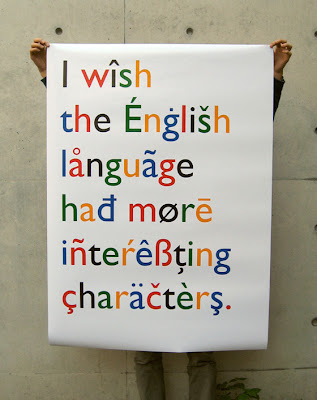The new and improved language blog, where posts about editing, language, and other fun stuff roam.
Wednesday, December 3, 2008
Tuesday, November 18, 2008
Monday, November 17, 2008
Friday, November 14, 2008
Wednesday, October 1, 2008
12 Fun Headlines
1. Something Went Wrong in Jet Crash, Expert Says
2. Police Begin Campaign to Run Down Jaywalkers
3. Safety Experts Say School Bus Passengers Should Be Belted
4. Drunk Gets Nine Months in Violin Case
5. Survivor of Siamese Twins Joins Parents
6. Farmer Bill Dies in House
7. Iraqi Head Seeks Arms
8. Lung Cancer in Women Mushrooms
9. Enraged Cow Injures Farmer With Ax
10. Typhoon Rips Through Cemetery; Hundreds Dead
11. New Vaccine May Contain Rabies
12. Include Your Children When Baking Cookies
Monday, September 29, 2008
Wednesday, September 24, 2008
Thursday, September 11, 2008
Semicolon Controversy

Semicolon: girlie? Your thoughts?
Tuesday, August 5, 2008
This Makes Me Happy

I love verbing. I think it's very funny and the source of many great new words. Go check out left-handed toons. More funny stuff where that came from.
Friday, August 1, 2008
One More Reason Not to Get a Tattoo

In the words of Ross: "Y O U apostrophe R E means YOU ARE; Y O U R means your!" Similar issue with its here, people. Some weird possessive issues going on with the cards this guy was delt [sic] . . . oh wait, I mean sick.
Friday, July 25, 2008
...Literally
Imagine my consternation then, when I read the second definition for “literally” from Merriam Webster: 2 : in effect : virtually
Thursday, July 17, 2008
O.K., o.k., Okay, OK, or okay?
Friday, June 20, 2008
Wednesday, June 4, 2008
Tips for Proper English
1. Avoid alliteration. Always.
2. Never use a long word when a diminutive one will do.
4. Employ the vernacular.
5. Eschew ampersands & abbreviations, etc.
6. Parenthetical remarks (however relevant) are unnecessary.
7. Remember to never split an infinitive.
8. Contractions aren't necessary.
9. Foreign words and phrases are not apropos.
10. One should never generalize.
11. Eliminate quotations. As Ralph Waldo Emerson said, "I hate quotations. Tell me what you know."
12. Comparisons are as bad as cliches.
13. Don't be redundant; don't use more words than necessary; it's highly superfluous.
14. Be more or less specific.
15. Understatement is always best.
16. One-word sentences? Eliminate.
17. Analogies in writing are like feathers on a snake.
18. The passive voice is to be avoided.
19. Go around the barn at high noon to avoid colloquialisms.
20. Even if a mixed metaphor sings, it should be derailed.
21. Who needs rhetorical questions?
22. Exaggeration is a billion times worse than understatement.
23. Don't never use a double negation.
24. capitalize every sentence and remember always end it with point
25. Do not put statements in the negative form.
26. Verbs have to agree with their subjects.
27. Proofread carefully to see if you words out.
28. If you reread your work, you can find on rereading a great deal of repetition can be avoided by rereading and editing.
29. A writer must not shift your point of view.
30. And don't start a sentence with a conjunction. (Remember, too, a preposition is a terrible word to end a sentence with.)
31. Don't overuse exclamation marks!!
32. Place pronouns as close as possible, especially in long sentences, as of 10 or more words, to their antecedents.
33. Writing carefully, dangling participles must be avoided.
34. If any word is improper at the end of a sentence, a linking verb is.
35. Take the bull by the hand and avoid mixing metaphors.
36. Avoid trendy locutions that sound flaky.
37. Everyone should be careful to use a singular pronoun with singular nouns in their writing.
38. Always pick on the correct idiom.
39. The adverb always follows the verb.
40. Last but not least, avoid cliches like the plague; They're old hat; seek viable alternatives.
Pronunciation- GHOTI
For example, how would you pronounce: "Ghoti?" If you're like me (and George Bernard Shaw, and other linguistic lovers, though Shaw wanted to simplify our spelling, but that's a topic for another day) we would pronounce it "fish." Why, you ask? Simple:
the -gh sound in "laugh."
the -o sound in "women."
and the -ti sound in "nation."
Get it? Ghoti= fish.
Thank you to my old teacher, Professor Harper for teaching me that fun tidbit of spelling, and thank you, English language, for being so messed up that we can say "Ghoti" and sound like the kind of meat that nobody likes!
Welcome!
Welcome to CACCAA!
This is Tracie speaking, cofounder of the Coalition against Cacophonous Commas and Abused Apostrophes. Charity is the other cofounder and my co-conspirator in our little world. Because Charity and I are quirky and editors and quirky editors, we have created this blog in an attempt to rant/rave against the many English errors we see in this world. This blog will also serve as a place to discuss the quirkiness of the English language in general. What this blog is NOT intended for is to insult or demean or pick on our various friends and family members. If you learn something from our blog, great. But please don’t think we are making fun of you or that we think you are unintelligent. Just remember, we are editors by profession and spirit, thus the quirkiness and analness of our general attitude about the English language.
Today's Rant
SCIENTISTS!







